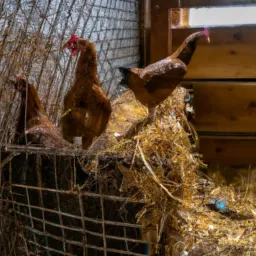Housing Your Backyard Hens: A Guide for Beginners
If you’re thinking about keeping chickens in your backyard, one of the most important things to consider is their housing.
Chicken coops come in all shapes and sizes, so it can be overwhelming trying to choose the right one for your flock.
In this guide, we’ll cover everything you need to know about housing your backyard hens.
Introduction to Housing Your Backyard Hens
Before choosing a chicken coop, there are some key factors to consider. Firstly, how many chickens do you plan on keeping?
You should aim to provide each bird with at least 2-3 square feet of space inside the coop, as well as additional outdoor space for them to roam around.
Secondly, what breed of chicken will you be keeping?
Some breeds require more space than others, so make sure to research which breed is best suited to your needs.
Finally, think about where you live – if you experience harsh winters or extreme temperatures, you may want to invest in a coop that provides insulation or air conditioning.
Choosing the Right Chicken Coop for Your Flock
There are several different types of chicken coops available, including wooden, plastic, metal, and even DIY options.
When choosing a coop, consider its size, materials used, ventilation, accessibility, and security features.
Wooden coops tend to be popular due to their classic look and durability, but they also require regular maintenance to prevent rot and decay.
Plastic coops are lightweight and easy to clean, while metal ones offer increased protection against predators.
If you decide to build your own coop, ensure that it meets all necessary safety requirements and has adequate ventilation to prevent moisture buildup.
See also Xinhonglei Metal Chicken Coop Review
How to Keep Your Chickens Safe and Secure
Keeping your chickens safe and secure is essential to ensuring their health and happiness.
Make sure to keep an eye out for potential predators such as foxes, raccoons, and hawks, and take steps to protect your birds from these threats.
This might include installing wire mesh around the run area, securing the coop door with a lock, or placing bells on your chickens to alert you when something approaches.
Also, make sure to regularly check your birds for signs of illness or injury, and seek veterinary care if needed.
The Importance of Cleaning and Maintaining Your Coop
Regularly cleaning and maintaining your chicken coop is crucial to keeping your birds healthy and happy.
Dirty conditions can lead to disease and parasite infestations, so make sure to remove droppings and other waste daily, disinfect surfaces, and replace bedding as needed.
It’s also important to inspect your coop for any damage or wear and tear and repair or replace anything that doesn’t meet safety standards.

By taking good care of your chicken coop, you’ll help create a comfortable environment for your birds and reduce the risk of illnesses spreading throughout your flock.
FAQs About Housing Your Backyard Hens
What type of flooring should I use in my chicken coop?
Ideally, you want to use a material that’s easy to clean and won’t cause slipping or injuries to your birds.
Many people opt for wood shavings or straw, although some prefer rubber matting or concrete floors.
Just remember to change out the litter frequently to avoid ammonia buildup and odor issues.
See also How to Keep Your Chickens Happy and Healthy in a Tractor
Do I need to heat my chicken coop during cold weather?
It depends on the climate you live in and the breed of chicken you have.
If you experience particularly harsh winters, then providing extra heating sources like heat lamps or electric blankets can help keep your birds warm and dry.
However, not all breeds require supplemental heat, so make sure to research which ones are better suited to colder climates before making any decisions.
Can I let my chicken’s free-range during the day?
Free-ranging your chickens can be beneficial for both their physical and mental health, as long as you have a secure outdoor enclosure for them to explore.
Just make sure to supervise them closely and bring them back into their coop at night to protect them from predators.
Also, be aware that letting your chicken’s free range could result in them eating insecticide-treated plants or coming into contact with contaminants, so monitor their behavior carefully.
